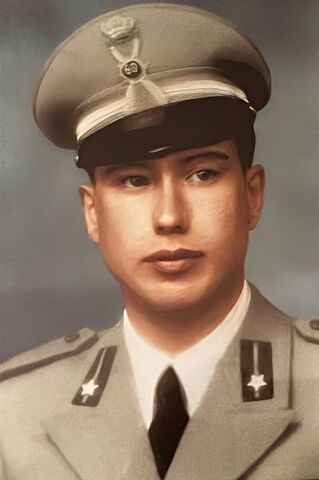
Nonno Gaetano Agnello would have been 109 years old today. Or was it today?
As the story went, the Agnello family was never entirely sure of the exact day when his mother, Maria Squadrito, gave birth to him in Santa Flavia, Sicily. His birth certificate was filed weeks later.
Nonno had two brothers, Pino and Salvatore, and two sisters, Anna and Agostina. It was through Agostina that he met his future wife, my Nonna Concetta, who lived in the neighboring town of Porticello. Nonna told us that he would act as a priest and baptize the girls' dolls.
In the summer months, he enjoyed swimming in the Tyrrhenian Sea. He was quite the diver and must have been a strong swimmer, as it's been said that he swam all the way out to Castello di Solanto, once a holiday home of the King and Queen of Naples.
Nonno's father, Salvatore, was a veteran of World War I, and for his service, he was awarded a business license. He opened a tabaccheria in Porticello, where his portrait hangs to this day (between pictures of Jesus and Saint Joseph). That store remains in my family, now owned by Nonno's great-nephew and my cousin, Massimo. It's just down the street from Chiesa Di Maria Santissima Del Lume, where Nonno was baptized and married.

In 1938, Nonna's family left Porticello, while Nonno remained in Sicily. When Italy joined the war on June 10, 1940, he was sent to serve with the Italian Army in Cagliari, Sardinia. But in later years, he rarely, if ever, discussed what his service entailed. And when anyone asked, he was quick to add, "My loyalty was with the king," meaning Victor Emmanuel III over Benito Mussolini.

Source: Wikimedia Commons
But the reality was less black and white. Nonno and Nonna had both participated in Fascist youth groups. Why? Well, for one thing, there was little choice.
The Fascist youth organization Opera Nazionale Balilla (ONB), founded in April 1926, was closely tied to Italy's education system. Boys and girls were divided by age into groups focused on physical training, discipline, and loyalty to the regime. Membership was compulsory up to age 11 (extended to older children in 1937). Staying enrolled brought benefits such as jobs and scholarships, while opting out meant limited access to education and civil service, and often marked families as potentially antifascist.
Nonno, like many of his compatriots, was likely conflicted. He'd been groomed to be a loyal Fascist, but as a soldier, he was poorly equipped, with outdated uniforms, weapons, and technology. In Cagliari, he would have endured years of relentless bombings, with conditions becoming especially deadly in 1943, when U.S. Air Force bombers began operating from airfields in Algeria and later Tunisia.

Nonno on a return trip to Italy, likely in the 1960s. He was the only member of his nuclear family to emigrate to the United States.
But he shared none of that. He would change the subject and turn the page in his ever-present, worn English dictionary to a new word on which to quiz me on vocabulary. Language was important. He'd struggled with learning English enough to know that. At other times, he'd pose philosophical questions, such as, "If space is fixed but time has moved, can one truly meet themselves in the same location?" One day, he handed me a weathered copy of The Divine Comedy, a treasured gift I keep on my shelf to this day.
His interests extended beyond the books. He had a green thumb. Along with rows of All-America Rose Selections award winners, he grew fruits and vegetables from seeds shipped from Sicily. Among these were his prized cucuzzi, which grew to the size of extra-long baseball bats in a six-foot-tall cage, and tomatoes, which he would sun-dry for Nonna to use as tomato paste.
He also loved animals. In addition to his two dogs, Heinie and Jude, who ate a version of whatever Nonna was cooking that night, he loved to watch and feed a backyard squirrel friend he'd named Nutty.
And he had a sense of humor. During one family visit, he approached Nonna and asked, "Why don't you kiss me like you used to?"
Nonna laughed. She had just seen him place a hot pepper on his tongue. She loved him, but she knew better.

Nonno passed on May 1, 2004. Nonna refused to celebrate Mother's Day that month and wore all black for the next year and four months until her own death on September 23, 2005. Beneath a single gravestone, they were buried side by side.

Nonna Concetta and Nonno Gaetano with their children, JoAnna, Salvatore, Santa Maria, and Maria, in 1966
Nonno and Nonna are gone, but their stories and lessons remain with us. Through their love, loyalty, and resilience, they left a legacy that not only shaped their own family but also the values we carry forward today. Their experiences inspired me to write The Last Letter from Sicily, a story about a promise that guided two young lovers through even the darkest times: to find each other, no matter the distance or the war. I am honored to share that story with the world.

Nonna Concetta, Auntie Jo (Giuseppina), my mother, Santa Maria, and Nonno Gaetano at my First Communion ceremony.
Learn more about The Last Letter from Sicily, inspired by my grandparents' story.